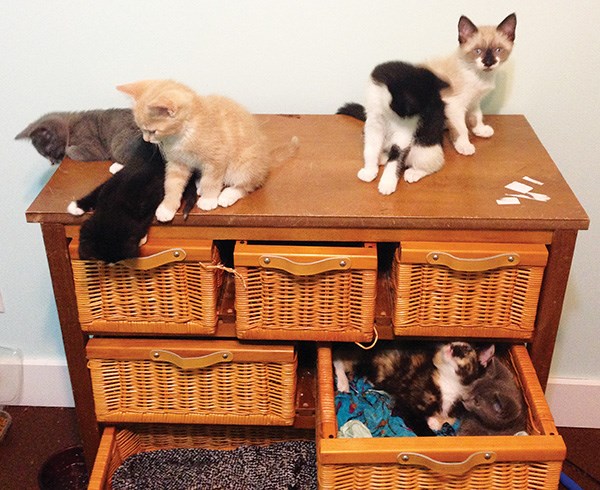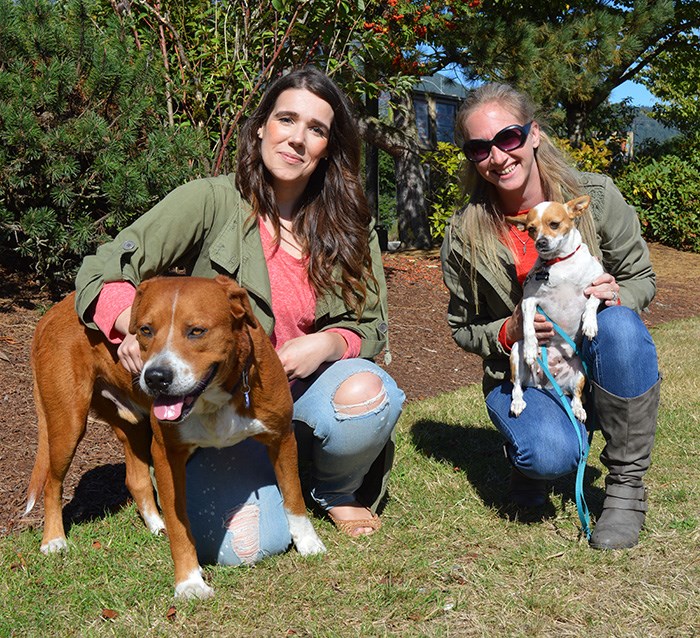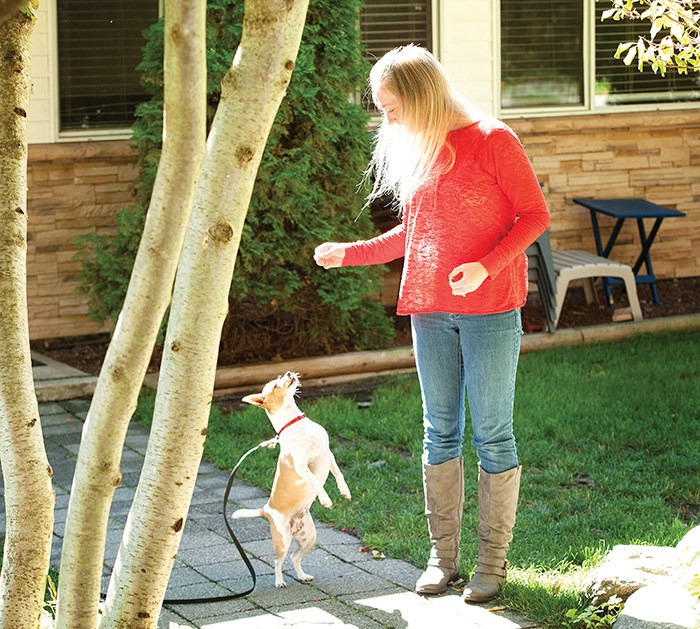Fostering pets is a way of life for Jay Butler and her husband, who take in puppies and kittens until they find a forever home.
They have provided temporary accommodation to animals since 2011 and have looked after animals with special needs, including a playful puppy with immune system issues.
“It is suitable for us to have animals staying with us,” says Butler, who is able to take the animals to work if required. “I just love baby animals so much.”
Like Butler, more Squamish residents are stepping up to provide a place for pets to live before a forever home comes along.
The SPCA has about 40 foster homes on its email list, though there are about 15 homes that regularly take in animals.
“Everything is covered,” says Marika Donnelly, the branch manager. “People just need to have the room and time.”
Having foster homes means the SPCA can take in a lot more animals because it frees up space. For example, there might be 60 to 70 animals in care, though only 20 at the actual shelter.
“Per year, on average we’re caring for about 300 animals,” Donnelly says.

Fostering is particularly important for dogs because the shelter is not set up for kennels, and for cats the SPCA usually fosters kittens until they are old enough to be adopted.
The pets looking for forever homes can be kittens or puppies that have been abandoned, or they may be older when turned over to shelters, or come from far away to escape communities with shelters with high rates of euthanasia.
“The foster program is so integral to our being able to operate,” Donnelly adds.
Seeing the animals improve in every way is part of the appeal for Butler.
“Often they start out really shy,” she says.
The SPCA is not the only operation that fosters animals in town. Others come to Squamish from further away.
Rosier Days Dog Rescue takes in dogs from high-kill shelters in the Los Angeles area. Volunteer Michele Groen says that while there are problems with stray and unwanted animals closer to home, nothing prepared her for how bad the problem is in parts of the U.S.
The fostering program started when Rosier Days founder Tara Pawlenchuk, then living in Squamish, was in Los Angeles for work and stopped by a shelter where she saw many dogs facing a drastically shortened lifespan. The program now operates both here and Victoria.
Groen started getting involved early and has fostered seven dogs – some big, some small, some easy and some challenging. Recently, she has been looking after Cassie, a two-year-old chihuahua-terrier cross that is good with kids and other dogs, although not a big fan of motorcycles. There is little evidence of the high-stress environment in which she lived briefly before being rescued. Quick to greet with a kiss, she clearly likes people.
Pawsitive Animal Rescue is another service in Squamish that rescues dogs from high-kill shelters in the L.A. area. Erica Eyged started it a couple of years ago, although she has been helping animals for a long time.
“Everywhere I’ve gone, I’ve rescued animals,” she says.
She thought she would handle one or two dogs monthly, but typically Pawsitive brings in eight to 10 a month, with help from volunteer “pullers” down in California who look for the dogs at shelters. The high number she brings in represents success at Pawsitive.
“It’s only because they get adopted so quickly,” she says.
Even then, it seems Eyged leaves an impression on the animals.
“The dogs get really attached to her, and they always remember her,” says Krista Seamans, who recently fostered a min-pin and dachshund cross named Tino.
She decided to start fostering in the spring, but it seemed like a natural fit, as her first dog had been a rescue she found on a visit to Tijuana while she was living in San Diego. She knows first-hand how bad the situation can be for the dogs down south.
“These animals are discarded on the streets, or they take them out to the desert,” she says.
Pawsitive then brings them north to find good homes. Again, like other programs, the animals get check-ups, are spayed or neutered and micro-chipped before they are made available for adoption.
One challenge for animal shelters is finding homes for big dogs, so to help out Christina Grant, who worked with Pawlenchuk, decided to get involved with Rosier Days recently.

Rosier Days’ volunteers Christine Grant, left, and Michele Groen take in dogs both big and small – in this case, Duke and Cassie.
- Mike Chouinard photo
She is only on her first dog, Duke, who also came from a shelter in L.A., though one where the dogs are housed longer.
In Duke’s case, it was six months, and while that might seem like a reprieve when compared with the fate of many dogs in L.A. shelters, the long time brings its own complications.
Duke was not a “people dog” but was fine around other dogs. In this case, the situation works well, as Grant has an affable Siberian husky named Oakley that loves other dogs.
The two dogs bonded quickly, but with Grant, Duke was standoffish at first, so fostering meant letting the dog have his space until he felt comfortable.
“We don’t know what he came from or what the environment was,” she says.
At first, Duke did not like to be touched, was sensitive to loud noises and would not turn his back on people.
“We felt like we were ill-equipped to deal with him,” Grant says. “He had to come to us. We couldn’t force it.”
These days though, Duke is quite happy to cuddle up at home.
As Groen explains, Rosier Days’ foster homes are really the first point for the dogs to move toward a normal home life.
“We call it the ‘transition place,’” she says.

Krista Seamans with a rescue from Pawsitive Animal Rescue. - MIke Chouinard photo
The idea behind fostering is for homes to be temporary stops in a supportive environment before finding a permanent home. With Rosier Days, the dogs typically stay three weeks to a month.
Often, many foster families have their own pets, but it can be a way for some people to get used to having an animal in their homes.
Many, of course, end up “failing” on occasion, meaning they adopt one of the animals they have fostered.
“I know a lot of our foster homes have problems letting them go,” says the SPCA’s Donnelly.
Groen admits the thought of permanently adopting a foster animal has crossed her mind, but there is an important consideration that holds her back.
“I knew it would make continuing to foster more difficult,” she says.
• The SPCA can be reached at 604-898-9890. For more information on Rosier Days Dog Rescue, see www.rosierdays.com. Pawsitive Animal Rescue can be found on Facebook.




